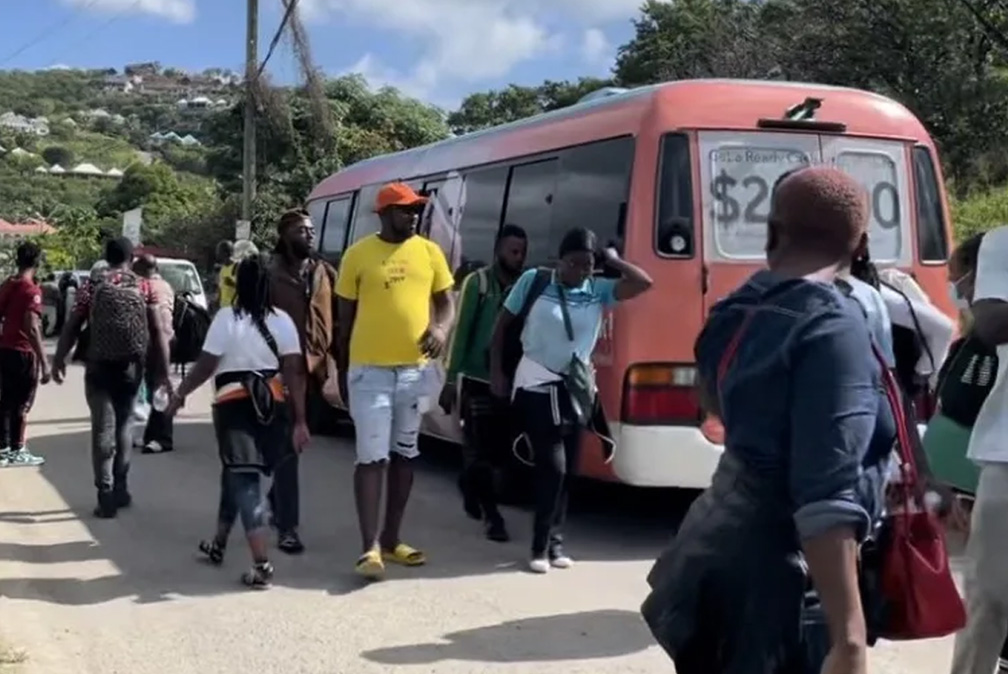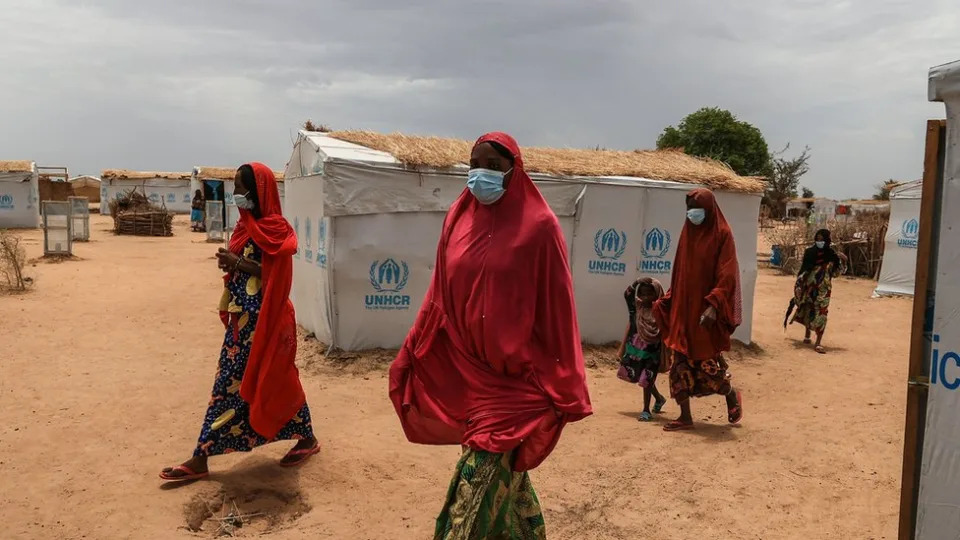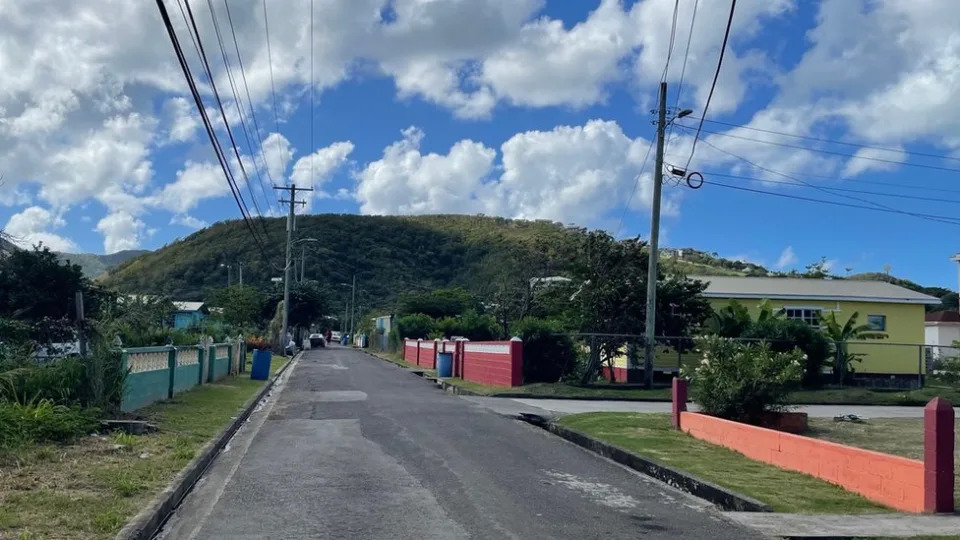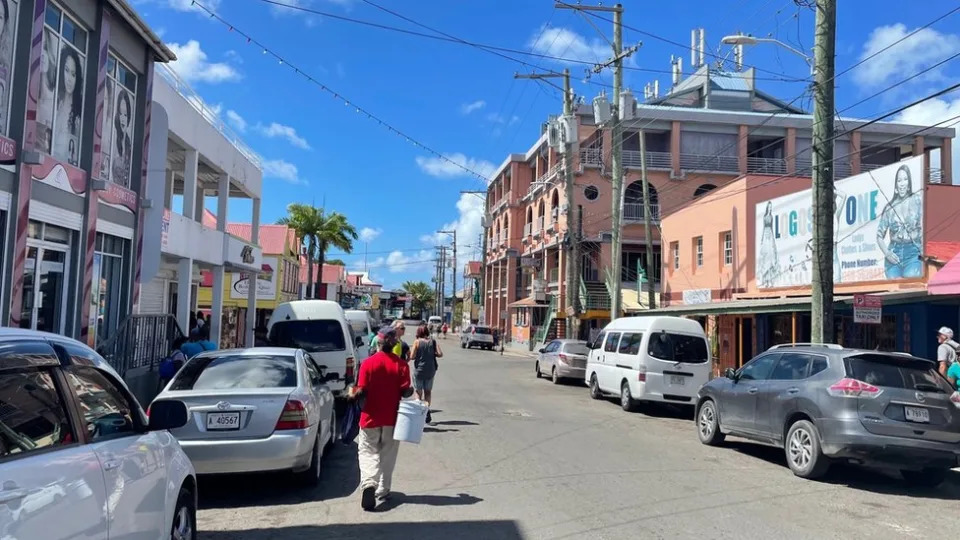Africa
The Cameroonian migrants stranded on a strange island

- JD Vance breaks polling records in the worst way - July 25, 2024
- Donald Trump’s Losing Election Poll for First Time in Over a Month - July 25, 2024
- FBI Is Not Fully Convinced Trump Was Struck by a Bullet - July 25, 2024
Africa
Could South Africa be the first-ever country to provide a no-strings-attached universal basic income?

South Africa suffers from severe income inequality — one of the worst anywhere in the world. Its unemployment rate, meanwhile, is over 30%.
But its government thinks it has a solution: a universal basic income .
The idea has broad political support and the country’s largest political party, the African National Congress, said recently it is committed to implementing a universal basic income within two years.
Once the figment of ideological dreamers, a universal basic income — regular direct cash payments to a population with no strings attached — has grown in legitimacy, especially after the success of COVID-era stimulus checks. Tech visionaries racing to develop ever-more advanced artificial intelligence have also suggested implementing a universal basic income. They say it would help mitigate the job losses from AI .
Several other countries have experimented with versions of a universal basic income. Kenya, for instance, offers unconditional payments to about 20,000 people in 200 different towns.
In the United States, numerous cities and some states are experimenting on a small scale with guaranteed basic incomes , which offer no-strings-attached payments but only to select groups of people in need. While studies have shown these American programs to be successful, they have also run up against significant political opposition .
But in South Africa, most political parties are all for it. They just need to work out the details.
“The ANC is committed to finalizing a comprehensive policy on the basic income support grant within two years of the new ANC administration, ensuring broad consultation and expedited action,” South Africa’s ruling party said in a statement .
That statement came a week before hotly contested general elections on May 29, which saw the ANC lose its majority in parliament. The ANC is now working to form a unity government and a commitment to implementing a universal basic income will almost certainly come up in negotiations.
According to the party, a study at the University of Johannesburg showed that a majority of South African citizens “fully support the introduction of a basic income support grant.”
While South Africa provides payments to certain groups living below the poverty line through its Social Relief Distress grant program, the ANC plan would open eligibility to all South African adults, the Guardian reported .
The ANC said it is “exploring” options, like new tax measures and a new social-security tax, to fund the program. The party also says its goal for the program is not to replace existing social-security programs, but to complement them.
If it follows through, the ANC plan would make South Africa the first country to provide a universal basic income.
- JD Vance breaks polling records in the worst way - July 25, 2024
- Donald Trump’s Losing Election Poll for First Time in Over a Month - July 25, 2024
- FBI Is Not Fully Convinced Trump Was Struck by a Bullet - July 25, 2024
Africa
In a historic election, South Africa’s ANC loses majority for the first time

JOHANNESBURG — South Africa’s ruling African National Congress party has lost its outright majority for the first time in a devastating blow for the party once led by Nelson Mandela. The ANC has dominated South African politics since winning in the first post-apartheid elections 30 years ago.
The ANC was braced for a disappointing outcome, predicted by polls before Wednesday’s elections, but the final results are even more sobering. It won 40 percent of the vote, falling from 57% in 2019.
Tessa Dooms, a director at Rivonia Circle, a think tank in South Africa, said it was a historic result that diminished the ANC’s three decades hold on power. “The election in South Africa is an important watershed moment that fundamentally changes politics,” she said.
According to the constitution, the party with the largest vote has two weeks from the result confirmation to form a new government. The ANC will now have to form a coalition government with one or more opposition parties for the first time, to remain in power.
Driving the party’s waning support is an all too bleak reality for millions of people.
South Africa remains one of the most unequal countries in the world, with 32% unemployed, along with soaring levels of crime. Immense frustrations with water and electricity shortages as well as corruption have led to growing criticism of the ANC government.
For many, the initial progress that followed liberation from white-minority rule has not been sustained. Despite significant achievements in Africa’s most industrialized nation, inequalities inherited from the apartheid regime have remained, and over the last decade, even worsened. The party’s vote share has fallen by a few percent in every election since 2004 — exacerbated by a generation divide, with younger voters born after apartheid, the so-called “born frees”, less likely to vote for the ANC.
“On the one hand, we overcame apartheid as a structural force,” Dooms said, “On the other hand, we have not actually changed many of the dynamics. We inherited inequality of one form, and we have doubled down on inequality in South Africa and another form going forward and it has hurt us.”
But in this election, the gradual decline in ANC support over the last 20 years grew more dramatic, Dooms said. “The ANC has in some ways imploded in the form of its former president, Jacob Zuma. The rise of the MK is certainly the biggest story of this election.”
The fall and rise of Zuma
The controversial, convicted former ANC leader’s new party, the uMkhonto weSizwe party, or MK, was the story of the election. MK was named after the disbanded military wing of the ANC, and registered just six months ago. But in a short space of time the party has soared above expectations. The party was bolstered by many former ANC supporters and a base of largely poor and ethnically Zulu South Africans who followed Zuma’s lead and left the ANC. It is now the third-largest party in South Africa, with almost 15%.
It caps a dramatic fall and rise of the 82-year-old leader. While a conviction bars him from being elected into parliament, as leader of the MK, he could now be a significant player in the negotiations to form a new coalition government, and could use his power to attempt to avoid a further conviction.
Zuma was forced to resign from the presidency in 2018, and was convicted in 2021 of failing to present himself at a corruption trial against him. He is also due to be tried again next year for corruption in an alleged arms deal in 1999.
The populist leader has accused his successor, President Cyril Ramaphosa, of being behind his legal troubles. Now Zuma has inflicted a major defeat on his rival, who is likely to face pressure from some in his party to resign.
Zuma’s daughter and MK member, Duduzile Sambudla, told NPR, “The MK is not willing to go into a coalition with the ANC of Ramaphosa,” she said, implying that a coalition would be possible without Ramaphosa.
The MK’s success against the ANC is most significant in South Africa’s second-most populous province, KwaZulu Natal (KZN). The party won almost 46% of the vote, against nearly 18% for the ANC in a landslide result.
Liberation icon Nelson Mandela first voted at the Ohlange High Schoolin Durban, KZN, in 1994, when he became president. Thirty years later, many voters at the same polling unit echoed a similar sentiment: frustration with the state of the country, and a desire for change.
Nqobile Khumalo, 24, arrived at the polling station shortly after polls opened at 7 a.m. on Wednesday and was voting for the first time. “We just really hope that there will be change,” she said. Tracy Bongiwe Zondo, 39, went further. “Before now I was voting for the ANC but now I’m voting for MK because I need a change in our community,” she said.
President Ramaphosa’s future is now an open question. He is the first ANC president to lose the party’s majority, has overseen the steepest fall in share of the vote (17%), and turnout has reduced to 58 percent. The ANC’s head of elections, Nomvula Mokonyane told NPR Ramaphosa would not step down. “Nobody’s going to resign,” she said. But Ramaphosa faces a major challenge to survive the duration of his second term, if he manages to form a government that based on the results, will likely be divisive.
- JD Vance breaks polling records in the worst way - July 25, 2024
- Donald Trump’s Losing Election Poll for First Time in Over a Month - July 25, 2024
- FBI Is Not Fully Convinced Trump Was Struck by a Bullet - July 25, 2024
Africa
Congressional Black Caucus condemns Speaker Johnson’s treatment of Kenya’s president

The Congressional Black Caucus (CBC) shared a post online Wednesday condemning Speaker Mike Johnson (R-La.) for refusing to host Kenyan President William Ruto for a joint meeting of Congress, which is typically extended to other international leaders.
“While @SpeakerJohnson might not have given the President of Kenya the opportunity to address a Joint Session of Congress, the CBC was proud to welcome President Ruto to the United States Capitol today,” the CBC posted on the social platform X . “We were honored to present President Ruto honorary membership in the CBC.”
Ruto is in town for a state dinner Thursday, President Biden’s sixth state dinner since taking office.
He posted on X highlighting CBC’s role in “advancing social justice, human rights and economic development across the globe.”
“We implore the Congress to take lead in reconfiguring the global financial architecture where power is not in the hands of the few. A bold, robust and targeted approach will free Africa of the debt burden and transform the world,” Ruto said on X .
The Hill has reached out to Johnson’s office for comment; it released statement to USA Today that Johnson offered the Kenyan Embassy “over 90 minutes of engagement including a one-on-one visit with Speaker Johnson, bipartisan leadership meeting with Speaker Johnson, Leader Jeffries, and Committee Chairmen and Ranking Members, and a bicameral meeting.”
Ruto said he was honored to be recognized as an honorary member of the CBC and shared photos of his visit.
The dinner will honor the 60th anniversary of the United States’s partnership with Kenya, and Biden plans to designate Kenya as a major non-NATO ally , the first in sub-Saharan Africa.
The post from the CBC was meant as a dig against Johnson, who is planning to invite Israeli Prime Minister Benjamin Netanyahu to address Congress. Johnson’s invitation has been met with pushback from some Democrats as the war between Israel and Hamas continues in Gaza.
- JD Vance breaks polling records in the worst way - July 25, 2024
- Donald Trump’s Losing Election Poll for First Time in Over a Month - July 25, 2024
- FBI Is Not Fully Convinced Trump Was Struck by a Bullet - July 25, 2024
-

 Anthony Obi Ogbo2 days ago
Anthony Obi Ogbo2 days agoSylvester Turner Should Cancel His Bid for Late Jackson Lee’s Congressional Seat
-

 Anthony Obi Ogbo1 week ago
Anthony Obi Ogbo1 week agoWas Trump’s Assassin unstoppable because he was White?
-

 Column2 days ago
Column2 days agoAdvocating for Reviving the 1960s Constitution Toward Creating a United Region of Nigeria
-

 News2 weeks ago
News2 weeks agoOMG: Donald Trump Shooter Was a Registered Republican
-

 Lifestyle2 weeks ago
Lifestyle2 weeks agoEddie Murphy and Paige Butcher Are Married! Inside Their Private Caribbean Wedding
-

 News2 weeks ago
News2 weeks agoDonald Trump survives assassination attempt; FBI identifies shooter
-

 Houston2 weeks ago
Houston2 weeks agoHurricane Beryl: Wazobia postpones family fanfare slated for this weekend
-

 Lifestyle2 weeks ago
Lifestyle2 weeks agoYale honors a young Black scientist after a neighbor falsely reported the 9-year-old to the police























